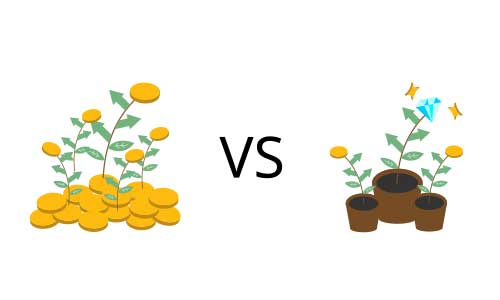Mutual funds vs PMS: Which One is Better?
Investing strategically is the key to securing financial growth, and two popular investment options for investors are Mutual Funds (MFs) and Portfolio Management Services (PMS).
While both options allow investors to grow their wealth through stocks and other financial instruments, they differ in their approach, customisation, cost, and risk. This guide will help you understand the differences between mutual funds and PMS, enabling you to choose the best option for your financial goals.
Best Investment Plans in UAE
Some of the best Investment quotes in UAE & Dubai are:





What Are Mutual Funds?
Mutual funds collect investments from multiple individuals and invest in diversified assets like stocks, bonds, and other securities. These funds are managed by professional fund managers and cater to different investment needs.
Types of Mutual Funds
| Type | Description |
|---|---|
| Equity Funds | Invest in stocks, which carry a higher risk yet provide significant growth potential |
| Debt Funds | Invest in fixed-income securities, providing stability and lower risk |
| Hybrid Funds | A mix of equity and debt, balancing risk and returns |
| Index Funds | Mimic market indices, offering passive investment with lower costs |
| Sector/Thematic Funds | Focus on specific sectors or themes like technology, healthcare, etc |
What Are Portfolio Management Services (PMS)?
PMS is a personalised investment service tailored to an investor’s risk profile, financial goals, and investment preferences. With PMS, a dedicated portfolio manager actively manages investments directly allocating funds in stocks, bonds, and other assets. This offers more flexibility than mutual funds.
Types of PMS
| Type | Description |
|---|---|
| Discretionary PMS | The portfolio manager makes investment decisions on behalf of the client |
| Non-Discretionary PMS | The manager provides investment advice, but the final decision rests with the client |
Key Differences Between Mutual Funds and PMS
Here’s the detailed comparison to help you answer “Is PMS better than mutual funds?” —
| Parameter | Mutual Funds | PMS |
|---|---|---|
| Minimum Investment | As low as AED 100 | INR 50 lakh (AED 241,084*) |
| Customization | Pre-defined strategy | Highly customisable |
| Management Fees | 0.5% to 2.5% | 2% to 2.5% (may include performance-based fees) |
| Regulations | Highly regulated by SEBI | Less regulated compared to mutual funds |
| Portfolio Management | Managed by a fund manager for all investors | Dedicated portfolio manager for individual clients |
| Risk Level | Varies (low to high) | Typically higher risk |
| Transparency | Regular disclosures | Limited public disclosure |
| Tax Efficiency | Tax-efficient for long-term investors | May have higher tax implications due to frequent transactions |
Factors to Consider Before Investing in PMS
- Investment Corpus: PMS requires a significant investment (minimum AED 241,084*)
- Risk Appetite: PMS involves higher risk due to its concentrated portfolio
- Investment Expertise: Understanding the complexities of PMS is crucial
- Cost: Higher management fees and performance-based fees apply
- Liquidity: PMS investments may have lower liquidity compared to mutual funds
*AED to INR rates are subject to variation
Factors to Consider Before Investing in Mutual Funds
- Investment Goals: Choose funds that align with financial objectives
- Risk Tolerance: Different mutual funds carry varying risk levels
- Investment Horizon: Mutual funds are generally more suited for long-term investments
- Liquidity: Easier to buy and sell compared to PMS
- Tax Benefits: If you are an NRI investing in India, some mutual funds offer tax-saving benefits under Section 80C
Grow Your Wealth with Mutual Funds — Invest Smart, Invest TodayInvest Now |
|---|
Should You Invest in Mutual Funds, PMS, or Both?
The right choice ultimately depends on your financial situation and investment goals —
- Choose Mutual Funds If: You have a smaller corpus, prefer simplicity, and want a diversified portfolio with lower fees
- Choose PMS If: You have a high investment corpus, desire a personalised portfolio, and are comfortable with higher risk
- Consider Both If: You have substantial funds and want a mix of customised and diversified investments
Conclusion
Both mutual funds and PMS offer distinct advantages. Mutual funds provide a cost-effective, diversified investment route suitable for all investors, while PMS offers personalised strategies for high-net-worth investors. Before investing, consider your risk appetite, financial goals, and investment horizon. Seeking guidance from a financial advisor can help you make an informed decision that aligns with your financial aspirations.
Frequently Asked Questions
1. Are Mutual Funds better than PMS?
Mutual funds are better for small investors due to lower investment requirements and ease of management, while PMS is suited for high-net-worth individuals (HNIs) seeking personalized investments.
2. What are the disadvantages of PMS?
- High minimum investment requirement
- Higher costs due to management fees and performance fees
- Less transparency compared to mutual funds
- Lower liquidity compared to mutual funds
3. Can I Invest in Both PMS and Mutual Funds?
Yes, diversifying between PMS and mutual funds can help balance risks and returns.
More From Investment
- Recent Articles
- Popular Articles























